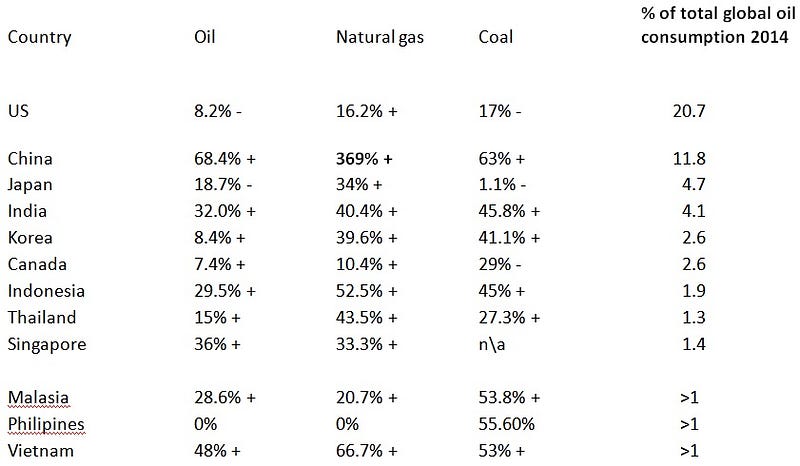Resolving the proposed Trans-Mountain Pipeline Expansion (TMEP) Stalemate

Right or wrong, informed or not, most Canadians have formed their opinion. So how did opponents of the pipeline garner enough support to oppose the will of the Canadian federal government? Thus far many smaller groups of people have banded together and tried to communicate the message that this project is flawed from many, if not all, points of view. This unfocused resistance has successfully run Kinder Morgan out of Canada and, after the government bought the pipeline without the consent of Canadians, halted any progress[i]. I will show, using publically available information and logic, how to communicate to even the most disinterested Canadian, that the TMEP is far more likely to be detrimental.
First let’s look at the projected future of Crude Oil consumption, what does it tell us about potential customers?
Percentile changes in consumption patterns (Mtoe) from 2004 to 2014

The chart above shows the following trends:
1. Global crude oil consumption continues to increase however, the pace of that expansion is slowing (American and Japanese consumption)???
2. Natural Gas consumption will continue to expand (see China)
The US Energy Information Administration (EIA) 2018 trend projection agrees with this.
EIA’s Annual Energy Outlook (2018)
“provides modeled projections of domestic energy markets through 2050, and it includes cases with different assumptions regarding macroeconomic growth, world oil prices, technological progress, and energy policies. Strong domestic production coupled with relatively flat energy demand allows the United States to become a net energy exporter over the projection period in most cases. In the Reference case, natural gas consumption grows the most on an absolute basis, and non hydroelectric renewables grow the most on a percentage basis.”
Given that:
demand for crude oil will likely increase modestly until 2050
competition among producers will likely increase
bitumen is one of the lowest grades of crude oil and requires significant processing before it can be useful
it appears that one of the goals of moving away from coal energy production is to slow the rate of air pollution; the lowest grades of crude oil (bitumen, heavy crude) energy production are next to be replaced
Canada’s primary markets (the US and Japan) for Crude Oil are shrinking and global energy production trends are moving away from heavy polluters
Because there are competitors that have better grades of oil, lower costs of production, lower environmental concerns, and are located much closer; the prospect for securing new buyers is not good, or at best will be challenging. I suggest we convert the pipeline to carry natural gas, and create something that has high probability of long-term success. Many of the risks associated with TMEP do not apply to natural gas. A properly designed and maintained natural gas pipeline should deliver the benefits derived from trade and address almost all environmental concerns. One major concern that will not be addressed is the inevitable increase in tanker traffic but this is not an insurmountable problem. Whether we like it or not natural gas is here to stay and this would make the best of bad situation. I believe that it is time to do what is best for Canadians: compromise, stop wasting resources, and create a win/win situation.
To convert supporters of the current proposed TMEP I suggest we encourage them to focus on facts not hopes.
The financial perspective is the only one that every Canadian should have an interest in.
For Example questions/comments like:
“Did you know that long term market trends do not support the TMEP”
“the government is knowingly squandering your hard earned money”
“Would you pay a higher price for an inferior product?”
“The economic case does not exist, therefore neither do the benefits.”
“the onus is on you to make an economic case for your proposal.”
The federal Canadian government and the government of Alberta are failing Canadians with their shortsightedness. Why do they continue to allow the waste of millions of dollars worth of resources?
In the event that the government has an economic basis for the TMEP, such as securing long-term contracts for the added capacity, why are they not sharing that information? Why not strengthen your position with actual facts? Is it not time that Canadians pull their heads out of the tar-sands?
https://www.statista.com/statistics/265491/chinese-coal-consumption-in-oil-equivalent/
https://www.eia.gov/todayinenergy/detail.php?id=22972
https://www.weforum.org/agenda/2016/03/3-trends-transforming-the-energy-sector
[i] https://www.thestar.com/vancouver/2018/08/30/federal-court-of-appeal-calls-trans-mountain-approval-unjustified-failure-in-major-win-for-first-nations-environmentalists.html